Super Coupe? 1972 Opel 1900 Rallye
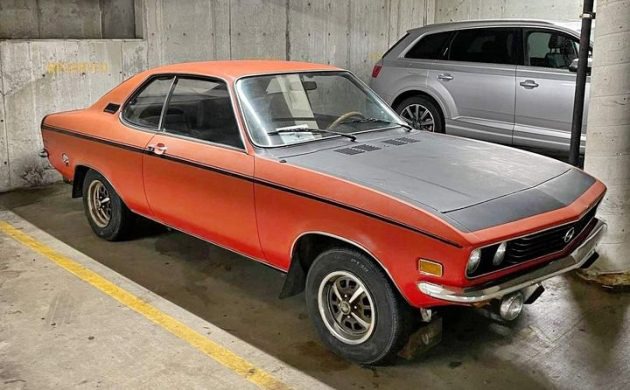
Car & Driver magazine said about the Opel 1900 Rallye: “The Opel 1900 Rallye is a very together car.” They went on to say, “Given our choice between any super coupe between the Atlantic and the Pacific, we’d take the Opel Rallye.” Wow, that’s high praise indeed. The seller has this 1972 Opel 1900 Rallye listed here on Facebook Marketplace, it’s located in Seattle, Washington, and they’re asking $6,500. Here is the original listing.
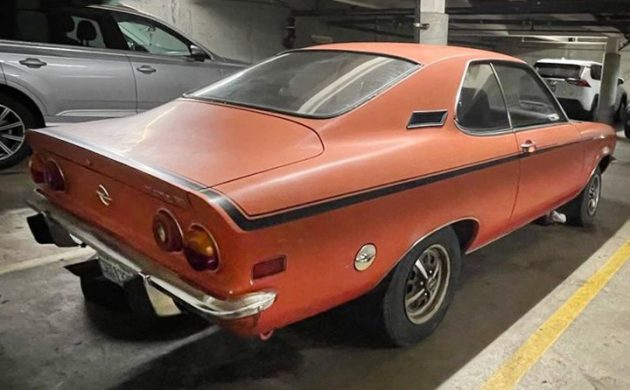
Some other car magazines have taken some heat lately, or at least have been accused of writing stories that are sponsor-friendly, but I don’t know if Car & Driver has been in on anything like that, they’re a pretty well-respected magazine. I’m not sure if any of us would refer to a 77 horsepower car as a “super coupe”, but they did, and that was the era of monster muscle cars, so that’s pretty wild. I would say that this car appears to be in super shape, whether it’s a super coupe is up to you. Car & Driver defined it as “They are light and compact and nimble. They don’t need power seats or power steering . . . all they require is a driver.”
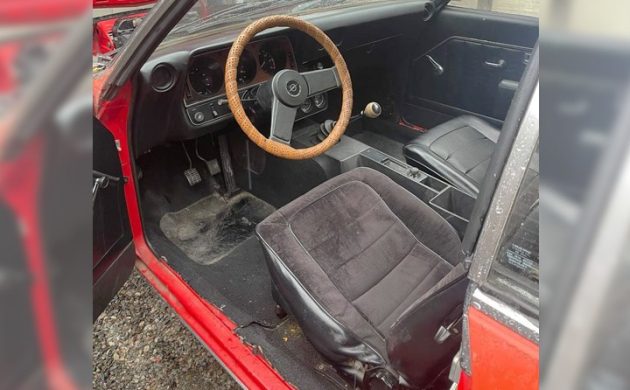
The seller is very short on photos, but they just added two photos so it’s not all bad news. They say that it has very little rust, but we don’t know where that rust is. The interior doesn’t appear to be in the same fine condition as the exterior, but it could be a fact of not cleaning and detailing it. The driver’s seat appears to have been recovered and the carpet needs help, all easy fixes.
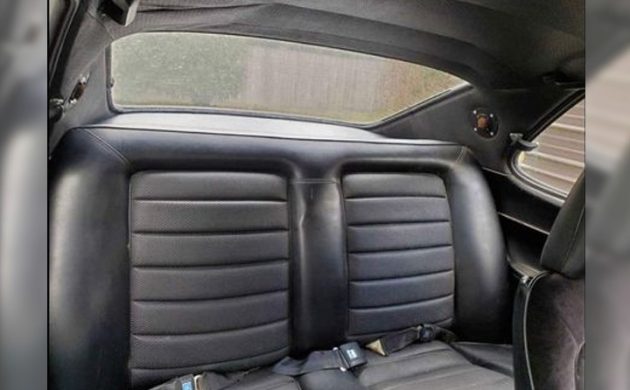
They say that it needs a new “blinker switch”, but in 2024, nobody cares about signaling their lane changes so why bother? The horn also doesn’t work. Again, it’s 2024, there are no laws or rules anymore. No horn, no biggie. No fog lights, now that’s something I’d fix! Just kidding, I’d fix everything. This is one of the photos they added, but it was a tiny vertical format photo of a photo showing the top half of the back seat. It looks good, though.
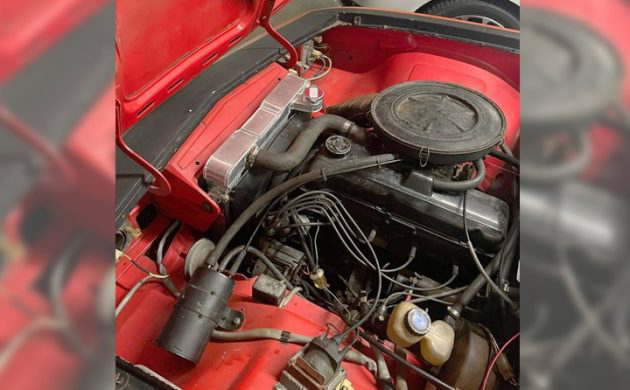
The engine would have originally been Opel’s 1.9-liter CIH (cam-in-head) inline-four with 77 horsepower and 94 lb-ft of torque, sending power through a four-speed manual to the rear wheels. This one reportedly has a “NAPA engine rebuild” from the previous owner and it’s said to run well, but the starter doesn’t engage all the time. There are tons of new parts on this car and they’re pretty rare to see today. Have any of you owned an Opel 1900 (or later Manta) Rallye?
Auctions Ending Soon
 2002 Subaru Impreza WRXBid Now2 days$333
2002 Subaru Impreza WRXBid Now2 days$333
 1975 Chevrolet Corvette ConvertibleBid Now2 days$4,000
1975 Chevrolet Corvette ConvertibleBid Now2 days$4,000
 1964 Ford F-100 Camper CustomBid Now2 days$2,000
1964 Ford F-100 Camper CustomBid Now2 days$2,000
 2006 Jeep Wrangler SportBid Now4 days$10,500
2006 Jeep Wrangler SportBid Now4 days$10,500
 1974 Datsun 260ZBid Now6 days$200
1974 Datsun 260ZBid Now6 days$200

Comments
Oh my goodness, just a matter of time, I suppose and who else better to post it? While on thin ice on “EA” as far as comments, I hope the site is fixed. Way back in May of ’21, this guy finds a ’68 Kadett Rallye, just like I had. Pretty creepy. Still blown away by that one. In that post, I pretty much described my Opel experiences. Briefly, I had several Opels. A ’67 Kadett wagon 1.1(?) did awesome holeshots,, the ’68 Kadett Rallye 1.9, that transformed me from V8 American gearhead, to the world of foreign 4 cylinder sporty cars. I had a Manta like this, non-Rallye, and had several friends and family members that had Mantas, all great cars.
Opel had its moment in the sun, just prior to the Asians cars, choices were few. The seemingly up side, was Buick dealers carried them. The downside, like Capri/Mercury, workers felt they robbed sales from the domestic brands, and they did in the quest for gas mileage, and service was mighty poor. The 1.9 motor cam-in-head motor, was a stout engine, came in many configurations. The Solex carb was the fly in the ointment, and I replaced several with a Pinto Autolite, with great results. Not the best performance or mileage, but spin they would for years. One must be cautious about rust with these, or any Opel. The front suspension is a stub off the unibody and I’ve seen many rust there. The Rallye boasted a different rear axle ratio, making it a bit quicker, and some aux. lights that did nothing, a tachometer, but pretty much, still a Manta. The base price( gotten from J.D. Power) lists this car as $3047 new, options pushed it to $5grand, so compared to say a Gremlin or Pinto/Vega, it was a LOT more, but the small slice of German engineering we got for that, was well worth it.
I get a lot of flak on my Asian car views, but with cars like Opel, Capri, or BMW, the Asian cars were definitely a set back, but go figure. Thanks, SG!!!
Thanks for the extra technical info, HoA, that’s great!
Had 2. One in Germany, a second one when I came back. Fun to drive, but rust easily and quickly. Needless to say, the German spec one was more fun.
Good weekend fun machine
Very nice little car! It looks like it wouldn’t take much to get in top notch shape. I thought they were always called Mantas, so the Ralleye is something I wasn’t aware of.
A buddy had a Kadette wagon and a two door, both very good, fun little cars. Another buddy had this same car only in a really pretty bronze.That also was a vry fun, reliable car that served him well for many years until a traffic accident wiped it out.
The Manta name didn’t come until 1973, before that, they were 1900’s. The Rallye (note the European spelling), was a sport trim level for the Manta/1900, there was also a “Lux” version, I think they called it, with a Vinyl roof and leather seats. The Rallye version got the blackout hood, fog lites, and upgraded instrumentation, with a tachometer, clock, oil pressure and temperature gage added to the instruments onboard, with the clock, oil pressure and temperature gages mounted in a small panel below the radio.
They were known as the Manta after 1973, Jim, but at least here they were called the 1900 in ’71 and ’72.
By here do you mean the United States or somewhere else. I thought they were always called Mantas too. I like the black hood treatment and lip spoiler on the back, nice looking cars. Somebody said 76 HP. I always thought the Opel 1900 put out more like a 100, even in U.S. smog spec.
Never owned one but have driven a couple. Very much similar to the BMW 2002 and a very nice driving car.
Had a ‘74. Worst car I ever had. Nothing but major problems from the day it rolled off the showroom floor.
IMHO. One of the best looking cars out of Germany, ever.
I always thought it bore more than a passing resemblance to some Ferraris. I think Opel designed it that way, much like the Big Three seemed to be copying Mercedes styling although the ’70’s.
My folks had one of these in the canary yellow with black racing stripes when I was a kid. Always loved the styling with the white interior and stick shift. I believe the Rallye package had the better cornering suspension as well. The lil brother to the baby corvette. Would be a sweet car to own and restore.
I had a 74 Luxus that was great, now looking for a 74 Rallye like this but in Signal Blue.
I owned a 73 manta Rallye white black hood and red interior 4speed
Blast to drive, felt fast driving on mountain roads, toss it into the turns!
Very Forgiving!
If it were closer I would definitely look at it to buy
Was in the “foreign car” fixing biz back in the 70s, usually cringed when Opals came in, as they did from time to time. I suppose, like anything, that someone immersed in them probably liked them, but I could never warm to them.
I worked for a Buick dealership that was the largest Opel dealer in the nation. The 1.9 engine ran fine but with a 1.5 cyl head it was a terror. As the article says the carbs were the problem and only because most people lugged them around town and shook the carbs apart. Mostly the screws came loose and naturally they didn’t run well until things got tight once again.
We had a customer that drove her Opel like a madwoman and never had a problem. She loved it.
I had one of these and the comment about the intermittent starter reminded me that I had that problem, but it wasn’t the starter. It was a broken tooth off the ring gear. When the engine stopped in that spot the starter had no “gear” to mesh with and just spun. The ring gear tooth on mine probably got knocked off by hitting the starter after the engine had already “caught” upon starting. You know that screech you get when that happens. With the manual you can just put it in gear and roll it to get past that bad spot on the ring gear. Just my thoughts to check for that before buying a starter.
When cars are turned off, the engines usually stop in the same places because of the compression stroke with no ignition. With 4 cylinders it would stop in two spots, 6 cylinders in three spots, and 8 cylinders in four spots. Often the bad ring gear was a result of starting in the same spots over and over. The solution with a stick was to engage the clutch as you were shutting it off so the engine would stop in a different spot. With automatics, just shut it off in gear. You can drive it indefinitely that way and rarely land on the stripped section of the ring gear.
Drove a ’73 with automatic , a “Blue Max” special. Great little car in its time !
My mother had a new 72 Ralley! Orange and black. We nick named it the great pumpkin. It was a great little car. She traded it for a silver 76 Vega GT 5-spd. As bad as the Vega’s rep was, it was also a great car! I still miss the Opel though.
I bought a used Opel Manta back in ’73 from my then girlfriend’s older brother who had bought it specifically for Gymkhana racing. It was a 1971 model. Accurate or not, here’s a link to Wikipedia’s account of model names and years: https://en.wikipedia.org/wiki/Opel_Manta
Looks like an oil leak underneath, plus was just jacked up or towed there, inspect before you buy.
Started my driving experience with Opels when I turned 16. Had many of the Kadetts from 1.5 and 1.9 sedans to Kadette wagons with 1.1 single carb…
Also owned many 1900s (Mantas) and later Opel Sport Wagons.
Would love to find a Kadett Rallye 1.9.
My parents had one of these and it was a tough little car. It was used and very
much abused by myself and my three brothers. It was the car that we learned to drive in. We used to have burn out contests with it. All of us could get second gear scratch but I was the only one that managed to get third gear once. It had over 200,000 miles on it when my Dad rolled it and totaled it.A lot of great memories there.
Our family owned two (2) of these when my baby brother and me were in college (1977-84). Mine was a green base model 1972 1900, and baby brother later bought a yellow 1974 Manta Rallye. We both put aftermarket stereos in them, as the rear package shelf is already stamped with 4″ holes in the sheet metal for rear speakers. We added two (2) 4″ speakers in the doors, Jensen Coaxials, naturally!
The battery is located directly in front of the steering wheel, over the fuse box, and battery fumes tend to cause the sheet metal to rot under the battery. Water then drips into the fuse box, causing major corrosion of the wiring inside the fuse box. Given this car’s location in the rain forests of the Pacific Northwest, that could explain the non-functioning turn signals and horn. We patched the holes with fiberglass cloth and epoxy resin, but a more permanent fix is new metal, then relocating the battery to the trunk.
Mine had dealer-installed air conditioning, baby brother’s did not. The Rolex carburetor in these was also problematic, mine was O.K., baby brother’s went bad, and when a rebuild kit couldn’t cure the issues, it was replaced with an aftermarket Weber with a manual choke, a popular upgrade back in the day! The Weber had a manual choke, like the European versions did, but the EPA frowned on that here, so the Solex carbs got automatic chokes heated by coolant, via a tap from the heater hoses. We drilled a hole in the dash and installed a manual choke kit where the choke knob was mounted in the European versions. By 1975, the last year in the USA, these cars got Bosch K-Jetronic fuel injection.
I loved my two Manta 1900s, and if this one was automatic (disabled, sorry), I would already have placed a deposit on it.
No need to apologize, but I learned how to drive a stick shift on mine, LOL! This one predates the Federal “Bash Beam” bumpers that showed up on the front of the car in 1973 and both ends of the car in 1974, so there’s that.
Drove one of these Opels from Dubrovnik to Lyubjania in ’78. Along the Adriatic coast had a flat tire. Unfortunately pulled over in front of a Soviet military base to change it. I must have changed this without saying a word in 15 minutes. Great handling car , I might add!
If you were suspicious of the Car and Driver write-up, read assured. In 1975 Consumer Report, whose testing procedure involves actually purchasing the test car, also declared the Manta among the best small sporty cars.
I owned a 74 yellow Manta from 78 to 82. I put over 100,000 miles on it without any problems, just routine maintenance. It took us on our honeymoon, but I sold it when we moved across the country. I wish I still had it, or an Opel GT.
I purchased a new 1974 Manta in 1975 (car had been on the dealer lot for almost a year} and had traded my 1967 Corvair Monza ( that is a whole story of its own). This was my first new car and I loved the car. I put about 75K on it by 1980 and sold it. Clutch failed early, before 20K if I remember correctly. Car was reliable and fun to drive. I remember thanking myself for NOT buying a Vega after finding out my friend, who had bought a new 73 Vega GT Wagon a year before, was going through a quart of oil a week. I saw the car several years at a garage and asked about it. It had failed PA inspection due to corrosion of the unibody. Salt takes it toll on the cars of that era.
At one time I shared driving to work with a guy who had one of these. One week we’d use my VW bug, next week his Opel. I remember that little Opel would scoot pretty good. Also remember something breaking on the carb and it sticking! It was wide open or shut it off, lol! We finally got it unstuck enough to drive home, he put a different carb on it before we drove it again. No idea whatever became of it when he changed jobs and I had to drive by myself all the time.
I broke both a throttle cable and a clutch cable in mine! Both easy fixes, but they both happened at inopportune times. The throttle cable snapped exiting the Maine Turnpike at 7:00 P.M. (1900 hours) on a Friday night, after all of the parts stores were closed, of course. I used a paper clip to splice the cable back together by twisting the broken cable ends onto each end of the paper clip!
The clutch cable snapped as I was upshifting to accelerate onto the Southeast Expressway Northbound (MA Route 3) from MA Route 128 Southbound at 6:00 P.M. (1800 hours) after leaving a job interview in Canton, MA, dressed in a suit and tie! I drove it all of the way home through Boston, on the infamous Central Artery, during stop & go rush hour traffic, power shifting the whole time! The only time things got tricky was when I had to come to a full stop and the engine stalled! Fortunately, this was before clutch safety interlock switches became a thing, and I was able to start the car while it was in gear, LOL!
I had one of these back in 1972 and I loved it. Different color though it was so much fun to drive.
I had that exact car in 72. If it were closer to MA I’d be very interested. It was a great car. Sticker price on the car was $2,500.
The rear end setup on these was fairly sophisticated for a compact car of the era, with coil springs, trailing arms and a Watt’s linkage holding up the solid rear axle in the back! Not a proper IRS setup, but as close as the corporate bean counters would let the engineers get, back in the day! Most of the domestic competition made do with leaf springs in the rear, or if they did use coil springs with trailing arms, they omitted the Watt’s link to save money. That pricier rear end setup was one of the reasons that the Opels handled so well.
Owned a1973 Opel Manta loved driving it. Wish I still owned it. Wish I still owned my ’69 Land Cruiser as well
Bought a ’73 Manta Luxus in the mid-eighties for the now ex-wife. Blue, blue vinyl top with a crank back sunroof and blue velour interior. It had the rally wheels and an automatic trans. Little sucker would spin the rear tires from a stop! Fun little car.
Had an ’68 Opel Rallye GT, gold with black patches. No a/c. Was the “go between” from a ’61 Corvair to a Fathom green, white interior 1969 Chevelle SS. You can guess which one I wish that I had back nowadays.
The 1.9 engines were rated at 102 HP. The 1.5 were rated at 80 HP.
The 1.1 single carb was 50 HP. 1.1 SR had 60 HP I believe with 2 one barrel carbs.
Sold!